Does Flax Seeds Make You Poop? A Natural Laxative that Helps!
Sometimes, we all need a little help getting things moving.
That’s where flax seeds come in. They are a natural remedy I’ve come to appreciate.
Unlike some quick fixes that can leave you feeling uncomfortable or even worsen the issue, flax seeds are a gentle way to support your digestive system.
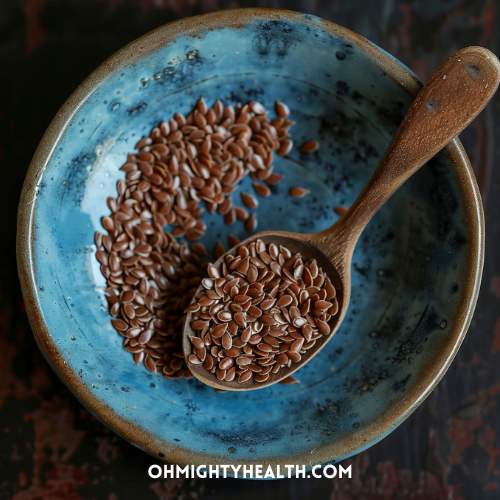
They’re packed with dietary fibre, which helps your digestive tract do its job more efficiently. All very naturally, just how we like it at Oh Mighty Health.
Flax seeds can help maintain regularity and also improve overall digestive health.
Of course, like many natural ingredients, it’s not a magic solution. It’s important to introduce flax seeds into your diet gradually to avoid any sudden changes in your bathroom habits.
The science behind flaxseed and digestive health
Flaxseed has earned its spot on my shopping list, and for good reason.
It’s what we call a functional food, meaning it’s great for your health beyond just nutrition.
The magic trio within flaxseed – omega-3 fats, antioxidants, and dietary fibre – work together to support your digestive health. Check my post on health benefits of flaxseed for more information.
These ingredients help maintain a happy and healthy digestive system, making flaxseed a staple in any diet focused on gut health.
I use flaxseed oil regularly. It adds an extra layer of goodness to my salads (best not to heat in order for the properties to stay intact).
So, yes, it is good especially for those of us looking to keep our digestive health in tip-top shape.
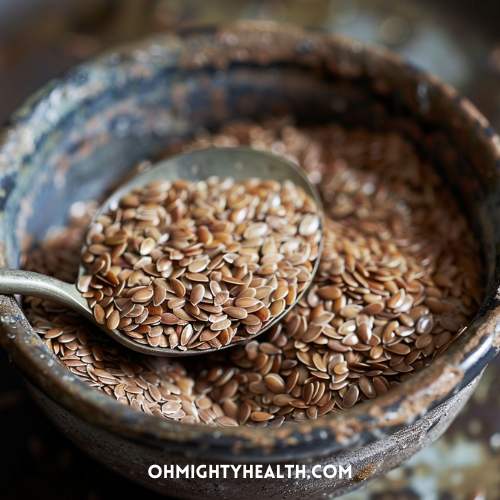
Flaxseed to relieve constipation: what does the research say?
Let’s look into what the research says about flaxseed for constipation.
Studies reveal that adding flaxseed flour to your diet can increase the frequency of bowel movements, thanks to its rich dietary fibre content.
Here’s more information on the study:
In the study, 60 people with functional constipation were given 50 grams of flaxseed flour with their meals every day for 4 weeks. This treatment significantly improved their constipation symptoms. How? There was a decrease in their constipation scores from 14 to 6.5, an increase in the number of times they went to the bathroom from 2 to 7 times a week, and an improvement in their quality of life related to constipation.
This clearly reveals that adding flaxseed flour into your diet if you have functional constipation can significantly enhance your bowel habits and reduce the severity of your constipation.
As you can see, this isn’t just good news for your stool consistency; it’s a win for your overall digestive health.
Flaxseed improves symptoms such as abdominal pain and bloating, especially for those with IBS-C. Remember, the key is to start with small doses to allow your body time to adjust, and baked flaxseed goods can be a delicious and effective way to incorporate this into your diet.
Is there a link between flaxseed and IBS?
IBS, or irritable bowel syndrome, can be a tricky condition to manage. Flaxseed, however, might just be the friendly ingredient we’ve been looking for.
Research points towards flaxseed as a helper for those with IBS-C by increasing the frequency of bowel movements. It’s a source of both soluble and insoluble fibre, which means it can help with constipation, abdominal pain, and bloating.
While more research is needed to solidify these findings, starting with a small amount and giving your body time to adjust can make a big difference for many.
A practical guide to using flaxseed for constipation relief
Incorporating 10-15 grams of ground flaxseed into your meals two or three times a day can significantly improve your dietary fibre intake (more on this below, keep reading).
This boost in fibre is exactly what your digestive system needs to help keep things moving smoothly.
So, how much flaxseed should you take for constipation?
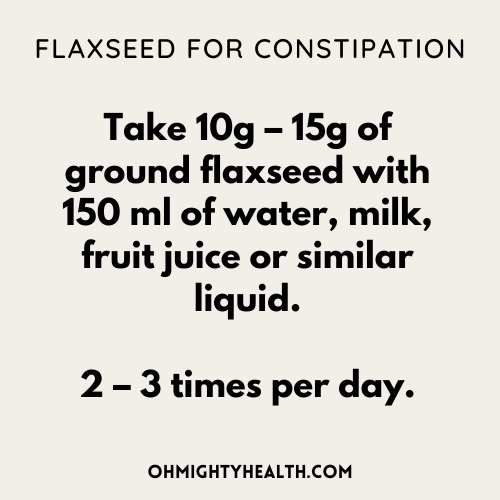
Starting with a small amount, around 1 teaspoon a day, and gradually increasing to 2 or 2.5 tablespoons daily, can provide the necessary fibre to stay regular without upsetting your stomach.
From my experience, you might start seeing improvements within 12 to 24 hours after taking flaxseed. Just remember to drink plenty of water throughout the day to enhance its effectiveness.
Here’s what the NHS suggests:
“Take 10g – 15g of seeds with 150 ml of water, milk, fruit juice or similar liquid 2 – 3 times per day.” Here’s the source of this information. I suggest you read the pamphlet.
(1 tablespoon is around 15 grams, just so you get an idea. So, if you do the math, 2 or 2.5 tablespoons a day is enough).
I’ve summarised it below for you:
- Flax seeds help prevent constipation, soften stool, and act as a natural laxative.
- Suitable for adults; not recommended for children under 12, pregnant/breastfeeding women, or those with hormone-sensitive conditions.
- Consume 10 to 15 grams of ground flaxseed with 150ml liquid, 2-3 times daily, not immediately before bed or with other medicines.
- May take 12-24 hours to act, up to 2-3 days for full effect.
- Important to drink 2 liters of fluid daily for effectiveness.
- Linseeds appearing in stool is normal.
Can flaxseed prevent future episodes of constipation?
Regularly including flaxseed in your diet can indeed help prevent future episodes of constipation.
As seen above, adding 10 to 15 grams of ground flaxseed to your meals 2 or e times per day can supply you with the dietary fibre your body needs for regular bowel movement.
Does the form of flaxseed make a difference in efficacy?

While flaxseed oil is rich in essential fatty acids, it lacks the dietary fibre that provides the constipation relief we’re after.
Ground flaxseed, on the other hand, is easier for our bodies to digest and utilise, making it a better choice for supporting digestive health.
Plus, if you’re into DIY, grinding whole flaxseed at home with a coffee grinder can be a fun and effective way to ensure you’re getting the freshest, most potent fibre boost.
How quickly can flaxseed alleviate constipation symptoms?
Regular consumption of ground flaxseed can start to show results fairly quickly (some research statistics below).
Including it in your diet two or three times a day provides the dietary fibre needed to promote regular bowel movements.
While everyone’s body is different, many people begin to notice improvements in their constipation symptoms within a few days to a week of consistent flaxseed intake.
Integrating flaxseed into your diet

Adding flaxseed to your diet doesn’t have to be complicated.
In fact, it can be quite delicious.
I take it every morning with my oats. I keep to around 1-2 tablespoons. Also, I grind the flaxseed myself (find out here how to best grind your flaxseed).
Whether it’s sprinkling ground flaxseed over your morning oatmeal, mixing it into a smoothie, or even baking it into bread, there are endless ways to enjoy its benefits, believe me.
The key is to start small and gradually increase your intake as your body adjusts. Again, I find that 1-2 tablespoons daily is ideal.
Remember, the best dietary changes are the ones that fit seamlessly into your lifestyle, making it easy to stick with them in the long run.
It took me a few weeks to “remember” the flaxseed in the mornings. But a couple of tricks (leaving the ground flaxseed in the fridge in a prominent place and grinding a batch for around 1-2 weeks ahead of time), helped me make it a part of my daily routine.
There are creative ways to include flaxseed in meals!
Getting creative with flaxseed is one of my favourite topics!
From blending it into your morning smoothie to adding a sprinkle on your salad for a nutty flavour, the possibilities are endless. Seriously.
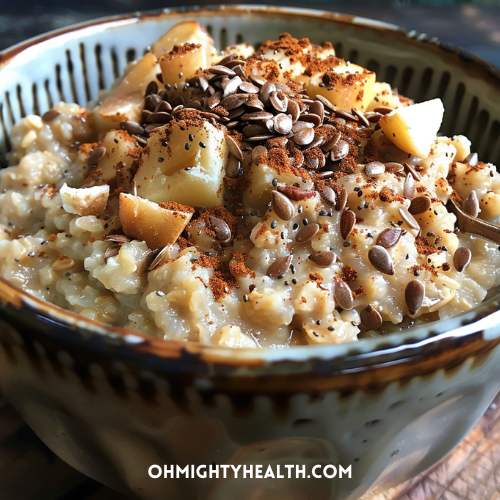
I wrote about it here: ways to integrate flaxseed into your diet, and here’s how to add flaxseed to your diet for weight loss.
Do take a look. I’m sure you’ll find plenty of ideas that could inspire you to incorporate flaxseed more creatively and effortlessly into your meals.
And if you’re ever unsure, a quick chat with your healthcare provider can give you some great ideas on how to make flaxseed a tasty part of your health journey. Don’t skip it if you can!
To keep flaxseed fresh and potent, it’s important to store it correctly. I always recommend keeping ground flaxseed in an airtight container in the refrigerator or freezer. This way, it’s protected from air and light, which can make the oils in flaxseed go bad. If you have whole flaxseeds, you can keep them at room temperature, but be sure they’re in a dark, dry place. Remember, fresh flaxseed means more benefits, so take a minute to store it right!
Nutritional profile and health benefits of flaxseed
When it comes to flaxseed, there’s a lot to love.
Beyond its role in digestive health, flaxseed is a powerhouse of nutrients that can positively impact your body in many ways.
For instance, it can enhance heart health and lower cholesterol levels.
It’s also been linked to reducing the risk of certain cancers and easing menopause symptoms.
Plus, it’s a great source of Vitamin E, which is excellent for your skin and immune system.
The broad spectrum of benefits makes flaxseed a superfood in my book, and it’s why I recommend it to anyone looking to improve their overall health and well-being.
While I eagerly await more large-scale studies to confirm these benefits, the existing research, including findings from a study, suggests flaxseed is a valuable addition to a healthy diet.
Potential risks and considerations
What about the side effects and precautions?
While flaxseed is generally safe and beneficial, it’s important to approach it with mindfulness.
Some people might experience stomach upset or diarrhoea, especially when starting flaxseed or taking it in large doses.
Gradually adding flaxseed to your diet can help your body adjust. It’s also worth noting that in rare cases, an allergic reaction to flaxseed can occur.
Always keep your healthcare provider in the loop, especially if you’re taking flaxseed alongside other medications or supplements.
What else helps when it comes to constipation?
Flaxseed is an excellent natural remedy for constipation, but there are other effective methods too.
Hydration plays a key role in digestive health, as drinking plenty of water daily softens stool and facilitates easier passage.
A diet rich in fruits, vegetables, and whole grains adds necessary fibre, which not only bulks up the stool but also speeds its movement through the intestines.
Regular exercise further supports this process.
Combining these practices—adequate hydration, a high-fibre diet, and physical activity—offers a simple, effective, and natural approach to maintaining digestive health and regularity.
Other natural remedies: chia seeds

Chia seeds are tiny seeds packed with fibre, just like flaxseed.
They can hold a lot of water (see below), which helps to hydrate the colon and ease the passage of stool.
When I add chia seeds to my diet along with flaxseed, I give my body an extra fibre boost.
This combo can be very helpful for maintaining regular bowel movements.
Mixing both into smoothies, oatmeal, or yoghurt can make for a powerful, constipation-fighting duo.
Comparing flaxseed with chia seeds: nutritional insights
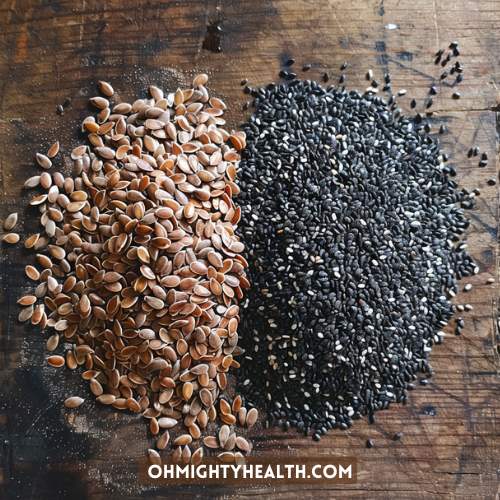
Once you enter the world of seeds, you’ll find yourself comparing the nutritional benefits of flaxseeds with those of chia seeds.
In fact, here’s my comparative article on flaxseed vs chia seeds, so I’ve got you covered.
Both are excellent sources of dietary fibre, but they each bring something unique to the table.
Flaxseeds offer a blend of benefits that can help with symptoms of constipation, making them a go-to for digestive health.
Chia seeds, with their slightly higher fibre content, can also support digestive health, but in different ways.
Chia can absorb a lot of water, which turns them into a gel-like substance in the stomach. This gel can help slow down digestion, leading to a steady release of energy and prolonged feelings of fullness.
It also aids in keeping the stool hydrated, making it easier to pass.
Moreover, this unique hydration capability can be beneficial for maintaining electrolyte balance, especially during exercise or hot weather.
How does flaxseed compare to other home remedies?
Flaxseed holds its ground when compared to other home remedies for constipation.
Its ability to speed up intestinal movement and increase the frequency of bowel movements sets it apart.
Many people, including those with IBS-C, find relief from constipation, abdominal pain, and bloating by adding flaxseed to their diet.
While more research is needed to establish strong evidence, the soluble and insoluble fibre in flaxseed makes it a valuable tool in managing digestive health!
Other home remedies for constipation include:
- Water and hydration: Drinking more water can help to soften stools and promote bowel movements.
- Prunes and prune juice: Prunes are high in fiber and contain sorbitol, a stool-loosening sugar that naturally helps relieve constipation.
- Regular exercise: Physical activity can increase muscle activity in the intestines, helping with bowel movements.
- Coffee: For some people, coffee can stimulate the muscles in the digestive system and act as a natural laxative.
- Fiber-rich foods: Eating more fibre helps increase stool bulk and movement through the intestines. Foods rich in fibre include beans, whole grains, broccoli, berries, and avocados.
- Probiotics: Consuming probiotic foods like yoghurt, kefir, and sauerkraut can help balance the gut bacteria and promote healthy bowel movements.
- Senna: An herbal laxative that stimulates the nerves in the gut to speed up bowel movements. It’s available over the counter and can be taken as teas, tablets, or capsules.
- Magnesium citrate: A natural mineral that can relax your bowels and provide a laxative effect. It’s often taken as a supplement.
- Aloe vera: Aloe vera juice may have a laxative effect for some people, helping to relieve constipation.
- Castor oil: Acts as a stimulant laxative, speeding up the movement of the intestines to stimulate bowel movements.
Last words
After exploring the various aspects of flaxseed, from its science-backed digestive benefits to practical tips on incorporating it into the daily diet, it’s clear that flaxseed holds significant potential for constipation relief.
Adding about 10–15 grams of ground flaxseed to your meals, 2 to 3 times a day, such as baked goods or smoothies, not only boosts your fibre intake but also promotes gut motility, making it easier for you to maintain regular bowel movements.
It’s important, though, to drink plenty of water to maximise the benefits, as hydration plays a crucial role in easing digestion.
However, while the nutritional benefits of consuming flaxseed are clear, individuals with underlying medical conditions, like constipated patients with type 2 diabetes or hemodialysis patients, should approach with caution.
The effect of flaxseed on blood clotting and its interaction with certain medical histories necessitates further research.
Therefore, consulting with a healthcare provider before making flaxseed a staple in your diet is wise, especially to tailor advice based on your specific health needs.
Yet, for many, flaxseed could be a natural and effective addition to their treatment of constipation, enhancing overall wellness.
I take it every day and love the results.
To take away
- Including flaxseed in your diet not only helps soften the stool but also promotes a smoother digestive process, making it easier for you to stay regular.
- While flaxseed is generally well-tolerated, some individuals may experience adverse effects, such as mild gastrointestinal discomfort, underscoring the importance of starting with small amounts.
- It’s rare, but important to note that without adequate hydration, high fibre intake, including flaxseed, could lead to an intestinal blockage, emphasizing the need for plenty of water.
- Research suggests flaxseed may have a stabilizing effect on blood sugar levels, making it a beneficial addition for those managing diabetes, though monitoring is advised.
- More studies are needed to confirm the full extent of flaxseed’s benefits, particularly in relation to its long-term use and impact on various health conditions.
- Emerging research is showing that flaxseed contributes to an increased frequency of bowel movements, highlighting its potential as a natural remedy for constipation.
- To ensure you’re getting the most out of flaxseed, be mindful of its shelf life; storing it properly can preserve its nutritional value and prevent spoilage.
- The effectiveness of flaxseed, marked by an increased frequency of bowel movements in individuals, underscores its role in promoting digestive health.

